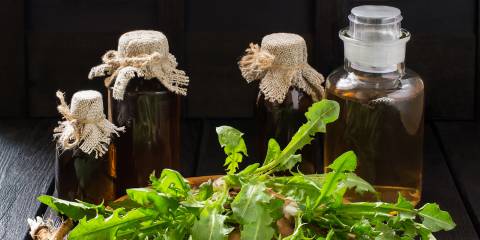Bitters are best known for the essential role they play in signature cocktails. These alcohol-based extracts of bark, roots, berries, leaves, or flowers of bitter-tasting plants burst with a range of aromatic flavors such as zesty orange, tarragon spice, and nutty coffee.
But taste is not their only perk.
Research has shown that bitters may also be a natural way to soothe an upset stomach and aid in digestion. As a result, there’s recently been a surge of interest in their potential healing power. Bitters can help reduce bloating, gas, food sensitivities—even heartburn. There is some evidence that they help cleanse the liver and prevent yeast overgrowth, while also contributing to regular bowel movements. And they’ve been known to help with weight loss by controlling food cravings.
A History of Bitters
Bitters were invented thousands of years ago when the Chinese brewed grapes, rice, honey, and hawthorn berries into a bitter-tasting liquid for medicinal purposes. According to Mark Bitterman, author of Bitterman’s Field Guide to Bitters and Amari, bitters were big in the 1800s, before Prohibition put the nail in the coffin of most bitters brands. Two survivors from that time are Peychaud’s and Angostura, a brand best known for the unique aromatic flavor it imparts to Old-Fashioned and Manhattan cocktails. Many bitters brands now exist, thanks in part to a cocktail renaissance.
“Bitters are to cocktails as salt is to food,” Bitterman says. “They help accentuate flavor and they bring their own flavors.” And like salt, only a dash is needed to enhance a drink.
While cocktail bitters are used in drinks, digestive bitters are often consumed with a few drops on the tongue. They can be taken by dropperful, spoonful, or spray.
How Do Bitters Work?
Registered dietitian and consultant Amy Goodson, MS, RD, CSSD, LD, says, “The claim is that bitters trigger receptors in the mouth that stimulate the secretion of saliva and other digestive enzymes that help break down your food so you can absorb its nutrients.”
Goodson notes that while there isn’t a lot of evidence-based research around bitters, a few scientists theorize that they stimulate blood flow to the digestive organs to aid in digestion. “With so many people suffering from digestive issues these days, bitters might be worth a try,” she adds.
While our taste buds can sense five different flavors: salty, sweet, savory, sour, and bitter, the latter has been pushed aside in favor of sweet and salty, which have overtaken our pantries and our palates. But this comes at a cost. Many nutritionists believe the lack of bitter foods in our diets may be contributing to chronic digestive issues. Shannon Sarrasin, ND, is one of them.
“Bitter is an uncommon flavor that has largely disappeared from our modern palate,” says Dr. Sarrasin. “Bitter foods and herbs were a common part of the ancestral diet and are still used in Chinese medicine and Ayurveda with huge benefits to body and mind.”
A Bitter Diet
Choosing naturally bitter foods such as radicchio, asparagus, grapefruit, dandelion, arugula, citrus, hops, olives, and vinegar can help put your digestive tract on the road to recovery. Bitter herbs including burdock, gentian, milk thistle, motherwort, goldenseal, and angelica also promote good health. If you prefer a supplement, bitter tonics such as cascarilla, cassia, orange peel, and cinchona bark can be found at health food stores. Most bitters contain alcohol, but you are using just a few drops at a time. There are also nonalcoholic types available.
No matter how you prefer your bitters, drink up. Your body will thank you.





